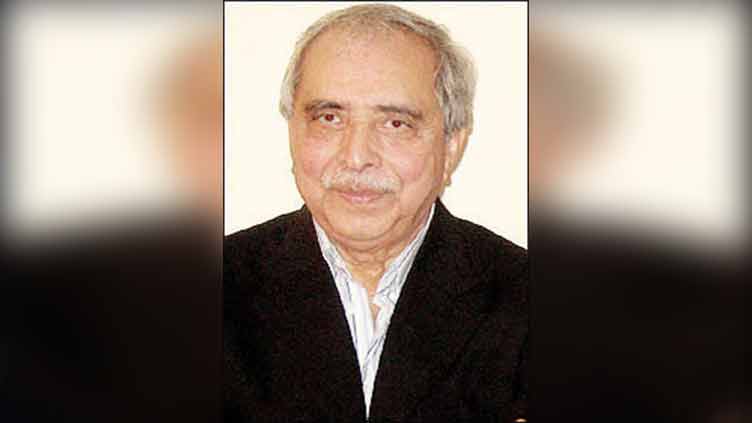Khalid Hasan - a writer who made words obedient to his will

Pakistan
Khalid Hasan - a writer who made words obedient to his will
By Salman Khan
Feb 5 marks the 14th death anniversary of Khalid Hasan, Pakistan’s celebrated journalist and writer. He was a man who wore many hats but his contribution to the field of journalism set him apart. He left an indelible imprint on the minds of his admirers as a prolific writer. A journalist of acknowledged standing, besides being a man with many facets to his personality, he excelled in the art of writing. What he wrote had “the freshness, verve and a sense of life” he had tried to inculcate in young writers throughout his career. Besides acerbity, flashes of wit and humour interspersed in his columns made them an enjoyable reading.
Khalid Hasan had the rare quality of being acutely sensitive to the use of the written word, knowing very well that no two words in English have exactly the same shade of meaning and that one word may be more dignified or emphatic than the other. A passion that became KH’s forte, he would often pass on these gems to the younger generation, lamenting at times a lack of interest that led to ‘living insults’ to a language like English.
“Can something be done about it, English I mean? Every time, I look at a newspaper report describing an incident, a traffic accident for example, or reporting a statement from the leaders who are in charge of sailing the ship of state, which may appear to some to be sinking, I begin to lose hope, both for English and for the ship.”
He went on to say: “What, one has to wonder, is the matter with us. Why have we calcified this exciting language called English? Why have we made it so boring, so lacking in the zing that is natural to it? Why do we continue to drag around the living dead of the language, its clichés? And why do we refuse to learn grammar, not intricate grammar that only gray grammarians know, but simple, basic grammar that we should have learnt in the first six months.”
That most Pakistani writers, be they journalists or other professionals, have a tendency to use out-of-the-way expressions, “long dead and buried”, remained his gripe. “Automatic writing”, he would say. Pointing out a lack of freshness and vigour in what most writers say, he said: “If someone is doing his best, he will be doing not just his best but his ‘level best’. If someone is saying something of which he is utterly certain, he has to precede it with ‘without fear of contradiction’. It is as if the entire world was waiting to contradict this person, the moment certain words left his mouth.”
He would advise the young writers to avoid adjectives, wherever possible, as they would avoid the devil or the plague and “use a simpler word, easy on the tongue and understood by everyone”. He was against overloading prose with cliches and metaphors. And idioms and proverbs “that were archaic when the steam engine was invented.”
He wrote in a column: “During the 1965 war, Hamid Jalal said, ‘If Shastri’s mother were to die suddenly, the story would be reported in the English language press in these words: ‘The hand that rocked the cradle of the man who launched naked aggression against the sacred soil of Pakistan, kicked the bucket last night."
To him expressions and words like ‘war footing’, ‘dire warning’, ‘cease and desist’, ‘glorious past’, Yeoman’s service ‘exhorting’, ‘eschew’ and many others were ugly. “Although yeomen disappeared a couple of hundred years before the British departed these shores, they only now exist in the Tower of London or in the Royal Navy, assigned in the latter to perform visual signalling. And, of course, they are alive and well from Landi Kotal to Karachi,” he would explain.
Consider other examples. “Achilles’ heel (only to be found, apart from the Subcontinent, in the pages of Homer’s ‘Iliad’), Herculean strength (poor Hercules has been dead a couple of thousand years, assuming he ever lived, but he is unforgotten in the Subcontinent), pioneering role (an essentially military term, a pioneer being the member of an infantry group serving to prepare a road for the main body of troops)."
In one of his columns he quoted that “nobody has given better advice on cliches than George Orwell. He wrote that the moment you suspect a word, phrase or expression to be a cliché, it is. Drop it like a hot potato (which, I concede, is also a cliché because you can drop a word without turning it into a potato which should be on your plate, not your hand).”
He also wanted expressions like in respect of, insofar as, notwithstanding the fact that, as a matter of fact, the fact of the matter, as far as this is concerned, in the case of, without the shadow of a doubt and proud privilege ‘externed’ from Pakistan.
His friend and admirer Ardeshir Cowasjee paid a well-deserved tribute to the penmanship of Khalid Hasan in these words: “He was a prolific writer and columnist and a very fine correspondent, and added to this were his numerous literary translations from Urdu to English. He ably mastered the art of using one word where others would use six and shunning superfluous adjectives. His writings were clean, neat, grammatically perfect and professional to the core.”
For Ejaz Haider, a seasoned journalist, “Khalid Hasan was a master of prose style and had the merit of great writers who can make their selection with great aplomb. He was witty; had the turn of phrase; and he could be acerbic when required – which, let me add, was quite often.”

